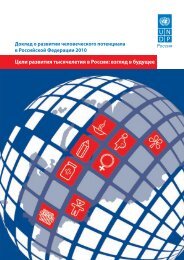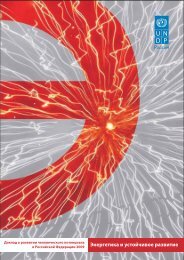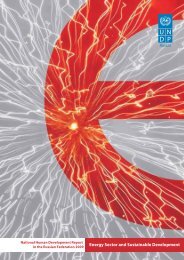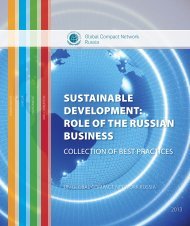Report - UNDP Russia
Report - UNDP Russia
Report - UNDP Russia
You also want an ePaper? Increase the reach of your titles
YUMPU automatically turns print PDFs into web optimized ePapers that Google loves.
• The unemployed, people who areeconomically inactive, and recipients ofsocial and disability welfare are at high riskof poverty;• A large number of those who are poor are inemployment.Although the number of people inpoverty has halved, the structure of poverty bymain socio-demographic groups has remainedunchanged. The biggest share of the poor arestill people of working age, particularly youngpeople: the share of the young people amongthe poor is larger than that in the overallpopulation. The risk of being poor is also aboveaverage for children, while the elderly, bycontrast, are 16.8% of the total population(2006 data), but represent only 13.1% of thepoor (although their share has been growing inrecent years). Growth in the share among thepoor of people who are of working age buteconomically inactive offers indirect evidenceof marginalization of that group of thepopulation. Such a conclusion is confirmed byspecialized research, which suggests that thisgroup includes a large number of young maleswho are not studying, working or seekingemployment 7 . Changes in the educationalprofile of the able-bodied poor show that theshare of people with higher education hasdecreased from 20.7% in 2000 to 13.2% in2006 8 . The objective reality in the presenteconomic environment is that birth of a secondchild in families pushes consumer behaviortowards that, which characterizes poverty.3.2. Role of the energysector in incomesand inequalityEconomic activities related to theenergy industry are traditionally well-paid,with low levels of labor-intensity. A picture oftheir contribution to personal incomes in<strong>Russia</strong> can be obtained from employment andwage indexes for businesses associated withenergy production and transportation (Table3.5). The statistics base, which is used, hasfigures for all sectors of the economy, but onlycovers large and medium-scale enterprises,leaving small businesses out of account. Thebase therefore covers 53% of all employees (asof June 2009) and 43% of total wages paid inthe economy. Around 9.2 million employees ofsmall businesses, 3.8 million self-employed,and about 7.2 million employees withindeterminate legal status are not included.But there are only about 50,000 people inthese categories working in the energy sector,equal to just 3% of those working at large ormedium-scale companies in the sector, andstatistical reporting suggests that wages insmall businesses related to power productionand transportation are 1.5-2.0 times lowerthan wages at large and medium sizedcompanies in the sector. So impact of theenergy sector on the labor market andhousehold living standards can be adequatelystudied though salaries and employment atlarge and medium-scale enterprises in thesector.The average wage in all energy sectorbusinesses as of June 2009 was 1.8 timeshigher than the national average wage.Highest wage levels were in pipelinetransportation (3 times higher than thenational average), and wages of pipelineworkers increased by more than 1.5 times(159%) during the crisis period in real terms.In other energy industries nominal increaseof wages failed to keep pace with 11.7%inflation in the period between June 2008and June 2009, so that real wages decreased.Wage levels in June 2009 were 94%compared with a year earlier in the extractionindustry; 93.3% in production of coke and oil7Poverty and Well-being of Households in Leningrad Region. Based on random interviews with households in April 2005 – SPb., CelestaLLC, 2007 – p.2888Social Situation and Living Standards in <strong>Russia</strong>. Statistical Digest/Goskomstat of <strong>Russia</strong> – M, 2001, p.144; Social Situation and LivingStandards in <strong>Russia</strong>, 2007. Statistical Digest/Rosstat – M, 2007, p.14959












